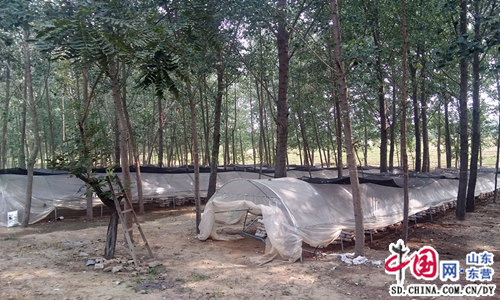Strengthen the "three pillars" of agricultural informatization
Original title: strengthening the "three pillars" of agricultural informatization

Wang Xiaobing, Deputy Director of the Department of Market and Economic Information of the Ministry of Agriculture, delivered a keynote speech (file photo)
The CPC Central Committee and the State Council attach great importance to the development of the Internet economy. In 2015, the State Council successively made arrangements for the development of e-commerce, promoting the "Internet +" initiative and promoting the development of big data. The Fifth Plenary session of the 18th CPC Central Committee clearly proposed that during the 13th five-year Plan period, we should vigorously implement the strategy of strengthening the country through the network, implement the "Internet +" action plan, develop the sharing economy, and implement the national big data strategy. Both the Central Rural work Conference and the National Agricultural work Conference held a year ago made further arrangements for vigorously developing agricultural informatization. We should profoundly understand, do a good job in implementation, strengthen the "three pillars" of "Internet +" modern agriculture, big data in agriculture and rural areas, and agricultural information security, so as to provide driving force and guarantee for remarkable progress in realizing agricultural modernization.
At present, agricultural modernization and informatization have formed a historic intersection, which provides a great opportunity for agricultural transformation and upgrading and leapfrog development. In the process of planning and promoting agricultural informatization, it is necessary to accurately grasp the four characteristics of agricultural informatization: first, it is everywhere. The future will be a world where everyone is connected, things are connected, and industries are connected. The Internet, like water and air, is inseparable from everyone, and will be integrated into all industries and fields of agriculture. The second is to make something out of nothing. The network world gives birth to unlimited possibilities. in the future, many new industries, new business type and new business models will emerge in agricultural Internet of things, agricultural big data, agricultural e-commerce and agricultural information services. The third is meticulous. At present, the market competition is changing from product-centered to service-centered. Whether relevant enterprises provide various services to farmers or sell agricultural products to urban and rural residents, they should enhance their awareness of service and provide meticulous and quality services. The fourth is the boundless wind moon. "Internet +" has great potential and bright prospects for the development of modern agriculture, big data in agricultural and rural areas, the Internet of things in agriculture, and agricultural e-commerce.
At the same time, we should fully understand the great role of agricultural informatization from the strategic height of implementing the spirit of the Fifth Plenary session of the 18th CPC Central Committee, adapting to the new normal of economic development, and building a well-off society in an all-round way. The first is to accelerate the rotation. It will help to speed up the realization of intelligent agricultural production, networked operation, efficient management and convenient service, and promote the transformation of the mode of agricultural development by relying on scientific and technological progress and the improvement of the quality of labourers. take the road of new agricultural modernization with Chinese characteristics with high output efficiency, product safety, resource saving and environment-friendly. The second is to accelerate the adjustment of structure. It is conducive to promoting the supply-side structural reform of agriculture, speeding up the establishment of a consumer demand-oriented agricultural industrial system, management system and production system, promoting the accurate matching of supply and demand, and meeting personalized and diversified consumption needs. The third is to accelerate the balance. It is helpful to speed up the realization of on-line and digitization of agriculture, improve the mechanism of "talking with data, making decisions with data, managing with data, and innovating with data", and improve the level of macro decision-making and management based on data. promote the balance of total supply and demand and structure of agricultural products. The fourth is to accelerate to make up for the deficiency. It will help to speed up the flow of information to lead the technological flow, material flow, capital flow and talent flow to rural areas, speed up the process of agricultural modernization, promote the integrated development of primary, secondary and tertiary industries, and help accurately help poverty alleviation and poverty alleviation, and make up for the shortcomings of agricultural modernization, especially poor rural areas, in building a moderately prosperous society in an all-round way as soon as possible.
In accordance with the deployment requirements of the "simultaneous development of the four modernizations," we should implement the development concept of innovation, coordination, green, openness, and sharing, and do a solid job in all key tasks of agricultural informatization, so as to provide new elements and new driving force for speeding up the construction of agricultural modernization. At present, the key is to strengthen the "three pillars."
The first pillar is to implement the "Internet +" modern agricultural action. This is the "operating system" for developing agricultural informatization. It is necessary to speed up the development of agricultural e-commerce, strive to solve the problems of asymmetric information, high circulation costs, unclear profit models, and imperfect credit systems, and strengthen the docking between the main bodies of agricultural production and operation and the e-commerce platform. we will expand the pilot project of e-commerce in fresh agricultural products, agricultural materials to the countryside, and leisure and sightseeing agriculture. We will vigorously implement the experimental and demonstration project of the Internet of things in agriculture, speed up the tackling of key scientific and technological problems, strengthen the application of the model of the Internet of things in agriculture to save costs and increase efficiency, and strive to take the lead in achieving economies of scale in areas such as livestock and poultry aquaculture and efficient facility agriculture. We will speed up the entry of information into villages and households, continue to expand the scale, gather service resources, strengthen risk prevention and control, improve the market-oriented operation mechanism, and speed up the online operation of the national information access platform. Ensure that public welfare services, convenient services, e-commerce and training experience are landed at village-level information service stations. We will increase the training of new farmers, incorporate village-level information workers, e-commerce, and information technology applications into new professional farmers and university student village officials, implement training in farmers' mobile phone application skills, organize national competitions, and cultivate and support a group of new farmers who understand both the Internet and agriculture.
The second pillar is the development of agricultural and rural big data. This is the "central processing unit" to promote agricultural informatization. We will speed up the transformation of agricultural data, vigorously promote data integration, sharing and orderly opening up, give full play to big data's forecasting function, and deepen big data's innovative application in agricultural production, operation, management and services. It is necessary to consolidate the foundation for the development and application of big data in agricultural and rural areas, build a national agricultural data center, promote data sharing and opening up, give full play to various data functions, and improve the agricultural data standard system. It is necessary to grasp the key areas of the development and application of big data in agricultural and rural areas, support intelligent agricultural production, implement accurate monitoring of agricultural resources and environment, carry out prediction and forecast of agricultural natural disasters, and strengthen monitoring and early warning of animal diseases and plant diseases and insect pests. realize the whole process traceability of the quality and safety of agricultural products, realize the traceability of the information query of the whole industry chain of crop seed industry, and strengthen the data support of agricultural product production and marketing information monitoring and early warning. Serve the innovation of agricultural management system and mechanism, promote the sharing of agricultural scientific and technological innovation data resources, meet the individual needs of farmers' production and operation, and promote efficient and transparent agricultural management.
The third pillar is to ensure the security of network information. This is the "firewall" to consolidate agricultural informatization. It is necessary to achieve synchronous planning, construction, and operation and maintenance of information construction projects and information network security. We will improve the security system of websites and important information systems, scientifically lay out and build disaster preparedness centers, improve network security management standards, and strengthen security protection measures such as virus prevention, vulnerability management, intrusion prevention, information encryption, and access control. Enhance network security monitoring and protection capabilities. We will formulate, improve and strictly implement network security systems such as information security level protection and risk assessment, and clarify the scope, boundaries, responsibility subjects and specific requirements of network security in various links such as data collection, transmission, storage, use, and opening up. Strengthen supervision and inspection to ensure that the organization, measures, technology and responsibility are in place to ensure the security of network information. (author: Wang Xiaobing, Department of Market and Economic Information, Ministry of Agriculture)
- Prev

In vivo treatment of attenuated bacteria with disease vaccine of turbot fish
In vivo treatment of attenuated bacteria with disease vaccine of turbot fish
- Next

The official of Lijin University Village uses small mushrooms to hold up the umbrella of getting rich.
The official of Lijin University Village uses small mushrooms to hold up the umbrella of getting rich.
Related
- A course of planting techniques and methods on how to grow carrots
- How to plant the latest tulips?
- Is it better to pick tea in the morning or in the afternoon? When is the best time for tea to be picked? what is the third or fifth tea?
- Launch Yuanxiao Happy combination Haocha + Tea Yuan healthy Taste
- Penghu Tourism "Fireworks 20 Parade with You"
- 2022 West Lake Happiness holds "Digital Revitalization Voucher" and draws iphone13 and laptop.
- Banqiao Fuzhou social houses are designed to change start-up combined with police elimination to create a safe and livable environment
- The convenient measure of "mechanical weeding" in Xinbei has been abused and the Agriculture Bureau has imposed heavy penalties on the illegal land consolidation.
- Changgeng University Joins Hands with Four Memory Factories to Rescue Memory Talent Shortage
- The list of Taiwan's top 100 MVP managers is listed by the Director-General of the Farmers' Association of Sanxia District.

